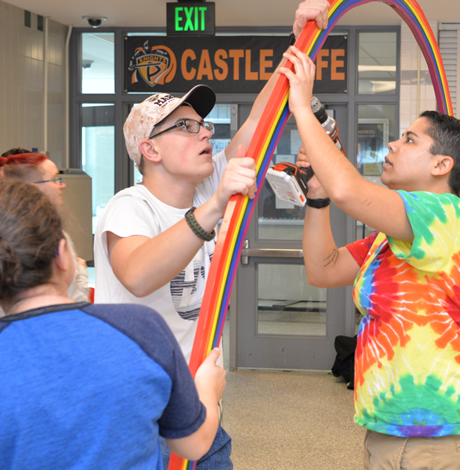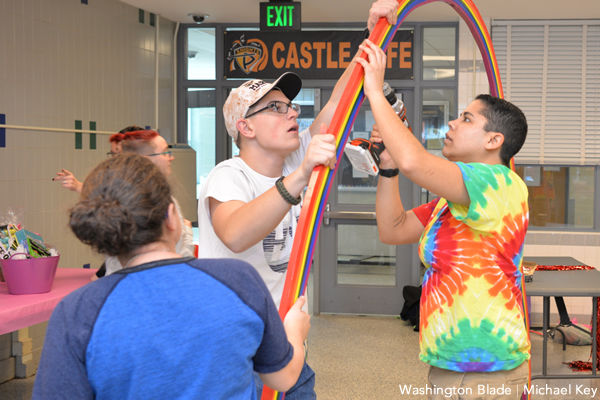Living
Hopeful glimmers
LGBT education activists report small gains despite overall political hostility


Despite setbacks, LGBT education activists are still making strides. (Washington Blade file photo by Michael Key)
My son is starting high school this fall, which I find hard to believe. It seems like just yesterday that I was driving him to preschool. This year feels different for other reasons, too.
Last year, we headed into school time with the assumption that progress toward LGBT equality and inclusion in education would continue with little hindrance. This year, however, the pall of federal actions against LGBT students, particularly transgender ones, hangs heavy over all of us.
One of the first acts of the Trump administration was to withdraw guidance instituted by the Obama administration on how schools should protect transgender and gender-nonconforming students under Title IX. More recently, Secretary of Education Betsy DeVos, a proponent of allowing students to use publicly subsidized vouchers to go to private schools, was asked by reporters on Aug. 4, “if she would intervene if states offered vouchers to private schools that discriminated against LGBT students,” the ACLU reports. They note, “She declined to answer or provide reassurance that taxpayer dollars would not be used to discriminate.”
And despite growing efforts in recent years to reduce anti-LGBT and other forms of bullying in schools and online, we now have a president whose personal behavior has been described as “a lot like plain old bullying” (CNN’s Chris Cillizza) and “bear[ing] many of the hallmarks of cyberbullying” (Politico’s Sarah Holder).
If you think the president’s behavior doesn’t have an impact in our schools, think again. In November, the Southern Poverty Law Center’s Teaching Tolerance project conducted an online survey of 10,000 K-12 educators across the country.
“More than 2,500 said they knew of fights, threats, assaults and other incidents that could be traced directly to election rhetoric,” it said in a statement. “Many teachers took pains to point out that the incidents they were reporting represent a distinct uptick; these dynamics are new and can be traced directly to the results of the election.” The behavior, it noted, was “directed against immigrants, Muslims, girls, LGBT students, kids with disabilities and anyone who was on the ‘wrong’ side of the election.”
What hope can we find then, in back-to-school times like these?
First, I do believe we will retain much of the progress we have made toward LGBT inclusion and understanding in schools. Organizations like GLSEN, PFLAG and HRC’s Welcoming Schools project have been doing terrific on-the-ground work for years. Resources for educators continue to increase. One recent notable work is Rethinking Sexism, Gender and Sexuality, an essay collection from Rethinking Schools that offers both practical tips and reflective insights on creating classrooms, curriculum and more to nurture all children.
The professional organizations of educators, too, are continuing their support. Last summer, the National Education Association, the National Parent Teacher Association and the American Federation of Teachers had all announced support for plans and policies to promote safety and support for LGBT students, working in partnership with local, state and federal authorities.
Right after the Trump administration’s announcement on trans students this year, Federation President Randi Weingarten said in a statement, “We want to be clear to those kids: (Abuse and harassment at school for being trans) is not OK with your teachers or with us at the (Federation), and we will continue fighting to protect you.”
Additionally, the Federation invited trans student Gavin Grimm, who brought a federal lawsuit against his school for not letting him use the restroom corresponding to his gender identity, to speak at their biennial TEACH convention in Washington in July.
The National Education Association kept up its support by adopting a resolution in June to “continue to advance” the rights of LGBT students and educators with a series of specific actions, including offering its members tools to promote local policies; legislative support; filing “friend of the court” briefs; and not holding meetings in cities with discriminatory policies. The organization also honored federal marriage equality plaintiff Jim Obergefell at its 2017 Human and Civil Rights Awards in July.
And when the Department of Education invited representatives from two anti-LGBT groups to speak at its “Engaging Fathers and Families” event in June, the National Parent Teacher Association withdrew.
I am also encouraged by the strength and resilience of young people themselves. The status of Gavin Grimm’s lawsuit is in question now that he has graduated, but he recently told LGBTQ Nation that despite the government’s anti-trans actions, “I see a positive future … because the conversation is growing.”
Regardless of whether Grimm himself succeeds, others are continuing the fight. Three trans students, Juliet Evancho, Elissa Ridenour and A.S., backed by Lambda Legal, reached a settlement Aug. 1 in which the Pine-Richland School District in Pennsylvania agreed to respect trans students’ identities with regard to student records, names and pronouns; to include gender identity in its nondiscrimination policies and to allow them to use the bathroom matching their gender identities.
And thanks to the efforts of trans advocates and allies in New Jersey, Gov. Chris Christie (R), not known as a strong LGBT supporter, at the end of July signed legislation requiring the state education commission to develop guidelines to create safe and non-discriminatory school environments for trans students.
All is not doom and gloom, therefore, although we shouldn’t minimize the struggles that remain. For those seeking some advice and assistance on navigating schools as an LGBT family, I’ve updated my annual annotated list of LGBT back-to-school resources, which you can find at mombian.com.
May the worst struggle we have this year be in trying to get our kids to do their homework.
Dana Rudolph is the founder and publisher of Mombian (mombian.com), a GLAAD Media Award-winning blog and resource directory for LGBT parents.
Real Estate
Convert rent check into an automatic investment, Marjorie!
Basic math shows benefits of owning vs. renting

Suppose people go out for dinner and everyone is talking about how they are investing their money. Some are having fun with a few new apps they downloaded – where one can round up purchases and then bundle that money into a weekly or monthly investment that grows over time, which is a smart thing to do. The more automatic one can make the investments, the less is required to “think about it” and the more it just happens. It becomes a habit and a habit becomes a reward over time.
Another habit one can get into is just making that rent check an investment. One must live somewhere, correct? And in many larger U.S. cities like New York, Chicago, D.C., Los Angeles, Miami, Charlotte, Atlanta, Dallas, Nashville, Austin, or even most mid-market cities, rents can creep up towards $2,000 a month (or more) with ease.
Well, do the math. At $2,000 per month over one year, that’s $24,000. If someone stays in that apartment (with no rent increases) for even three years, that amount triples to $72,000. According to Rentcafe.com, the average rent in the United States at the end of 2025 was around $1,700 a month. Even that amount of rent can total between $60,000 and $80,000 over 3-4 years.
What if that money was going into an investment each month? Now, yes, the argument is that most mortgage payments, in the early years, are more toward the interest than the principal. However, at least a portion of each payment is going toward the principal.
What about closing costs and then selling costs? If a home is owned for three years, and then one pays out of pocket to close on that home (usually around 2-3% of the sales price), does owning it for even three years make it worth it? It could be argued that owning that home for only three years is not enough time to recoup the costs of mostly paying the interest plus paying the closing costs.
Let’s look at some math:
A $300,000 condo – at 3% is $9,000 for closing costs.
One can also put as little as 3 or 3.5% down on a home – so that is also around $9,000.
If a buyer uses D.C. Opens Doors or a similar program – a down payment can be provided and paid back later when the property is sold so that takes care of some of the upfront costs. Knowledgeable lenders can often discuss other useful down payment assistance programs to help a buyer “find the money.”
Another useful tactic many agents use is to ask for a credit from the seller. If a property has sat on the market for weeks, the seller may be willing to give a closing cost credit. That amount can vary. New construction sellers may also offer these closing cost credits as well.
And that, Marjorie, just so you will know, and your children will someday know, is THE NIGHT THE RENT CHECK WENT INTO AN INVESTMENT ACCOUNT ON GEORGIA AVENUE!
Joseph Hudson is a referral agent with Metro Referrals. Reach him at 703-587-0597 or [email protected].

Some vehicles age quietly — but not muscle cars.
For 2026, the Chevrolet Corvette tightens its focus, fixes one glaring flaw (the previously dowdy interior) and flaunts a futuristic design. The Dodge Charger, on the other hand, is loud and proud, daring you to ignore its presence at your peril.
CHEVROLET CORVETTE
$73,000-$92,000
MPG: 16 city/25 highway
0 to 60 mph: 2.8 seconds
Cargo space: 13 cu. ft.
PROS: Awesome acceleration. Race-car feel. Snazzy cabin.
CONS: No manual transmission. No rear seat. Tight storage.
Finally, the Chevrolet Corvette feels as good inside as it looks flying past you on the freeway. That’s thanks to the classy, completely redesigned cabin. Gone is the old, polarizing wall of buttons in favor of a sleeker, three-screen cockpit. There’s a large digital gauge cluster, a wide infotainment screen angled toward the driver, and a marvy new auxiliary display. Everything is modern and a bit glitzy — but in a good way.
Fit and finish are higher quality than before, and the controls are more intuitive. Chevy’s Performance App is now standard across trims, offering real-time data for drivers who enjoy metrics as much as momentum. And the new interior color schemes, including slick asymmetrical options, let you express yourself without screaming for attention—confidence, not obnoxious bluster.
As for handling, the steering is quick and sure, body control is exceptional, and acceleration is blazingly fast. A mid-engine layout also delivers sublime balance.
Three trim options, including the V8-powered Stingray, the E-Ray (also with a V8 but paired with electric all-wheel drive), and the Z06 and ZR1 variants for racing devotees.
(Note to self: For a truly mind-blowing experience, there’s the new 1,250-horsepower ZR1X all-electric supercar that goes from 0 to 60 mph in less that 2 seconds and is priced starting at $208,000.)
Yes, the ride in any of these Corvettes can be firm. And visibility is, well, rather compromised. But this supercar is a total Dom, not a timid sub. Think Alexander Skarsgard in “Pillion,” and you get the picture.
DODGE CHARGER

$52,000-$65,000
MPG: 16 city/26 highway
0 to 60 mph: 3.9 seconds
Cargo capacity: 22.75 cu. ft.
PROS: Choice of gas or EV power. Modern tech. Spacious cabin.
CONS: No V8 engine (yet). Soft steering. Less-than-lithe cornering.
Everything old is new again for the Dodge Charger. The automaker initially was phasing out gas-powered models in a shift to electric vehicles but then quickly pivoted back to include gas engines after yo-yo regulatory changes this year from, well, the yo-yos in the White House.
Powerful twin-turbo engines in the R/T and Scat Pack trims produce up to 550 horsepower. These models come standard with all-wheel drive but can be switched to rear-wheel drive for classic muscle-car antics when the mood strikes you.
At the same time, Dodge still offers the electric Charger Daytona, delivering up to 670 horsepower and ferocious straight-line acceleration.
The Charger’s aggressive design, massive digital displays and practical hatchback layout carry over, reinforcing its ability to be both a performance diva and everyday companion. With the larger-than-expected storage space, I appreciated being able to fit a boatload of groceries in the trunk during a Costco run.
New wheel designs, paint choices and trim variations help you visually distinguish between gas and electric Chargers. But no matter the model, each one feels decisive and deliberate on the road. Commuting in stop-and-go traffic during rush hour is fine, but this street machine excels at high-speed cruising on the freeway.
The turbo six-cylinder engine delivers muscular torque with less drama than the old V8s, but still with plenty of urgency. The electric Daytona version is a different kind of thrill, with its instant, silent thrust that feels like it could almost launch you to the moon.
Steering is stable but not exactly crisp, and the Charger’s weight makes it less lithe—and lively—than other muscle cars, especially when navigating tight corners.
But that’s just fine with me. Like Bea Arthur as Dorothy in “The Golden Girls,” this no-nonsense muscle car is proud to be big, bold and brassy.
Real Estate
Top buyer-friendly markets for the LGBTQ community
Home should be a place where you can be fully yourself

Buying or selling a home is one of the most meaningful financial and emotional decisions a person can make. For LGBTQ+ individuals and families, that journey can also come with unique considerations — from finding truly inclusive neighborhoods to working with professionals who understand and respect who you are.
The good news? Across the United States, there are increasingly buyer-friendly housing markets where LGBTQ+ home buyers and sellers can find opportunity, affordability, and community. When paired with the right representation, these markets can offer not only strong financial value, but peace of mind.
For more than 30 years, GayRealEstate.com has been the leading source of LGBTQ+ real estate representation, helping LGBTQ+ buyers and sellers connect with vetted, LGBTQ+ friendly real estate agents who understand the nuances of fair housing, legal protections, and inclusive service.
Below, we explore top buyer-friendly markets for the LGBTQ+ community, along with practical tips to help you navigate the process with confidence.
What Makes a Market Buyer-Friendly?
A buyer-friendly market isn’t just about lower prices — especially for LGBTQ+ home buyers. It often includes:
- Increased housing inventory (more choices, less pressure)
- Slower price growth or stabilized pricing
- Greater negotiating power for buyers
- Established or emerging LGBTQ+ communities
- Local protections and inclusive policies
- Access to LGBTQ+ friendly real estate agents and resources
Markets that combine affordability with inclusivity can be especially attractive for first-time gay home buyers, same-sex couples, and LGBTQ+ families planning for long-term stability.
Top Buyer-Friendly Markets for LGBTQ Home Buyers
1. Austin & San Antonio, Texas
Once known for extreme competition, many Texas metros have shifted into more buyer-friendly territory due to increased inventory.
Why it works for LGBTQ+ buyers:
- Strong LGBTQ+ communities, especially in Austin
- More negotiating leverage than in prior years
- Diverse neighborhoods at varying price points
Tip: Texas does not have statewide LGBTQ+ housing protections, making it especially important to work with an experienced LGBTQ+ friendly realtor through GayRealEstate.com.
2. Columbus & Cincinnati, Ohio
Ohio cities continue to attract buyers looking for value without sacrificing culture or inclusivity.
Why it works:
- Lower median home prices
- Growing LGBTQ+ populations
- Strong healthcare, education, and job markets
These cities are particularly appealing for LGBTQ+ buyers relocating from higher-cost coastal markets.
3. Richmond, Virginia
Richmond has become a standout for LGBTQ+ home ownership thanks to affordability, history, and progressive growth.
Highlights:
- Inclusive local culture
- Buyer-friendly price trends
- Walkable neighborhoods popular with LGBTQ+ professionals
4. Minneapolis–St. Paul, Minnesota
The Twin Cities consistently rank high for LGBTQ+ quality of life and legal protections.
Why LGBTQ+ buyers love it:
- Strong anti-discrimination laws
- Stable home values
- Excellent resources for LGBTQ+ families
Minnesota offers one of the safest environments for LGBTQ+ home buyers and sellers navigating the real estate process.
5. Jacksonville & Tampa Bay, Florida
Florida remains complex for LGBTQ+ buyers, but some metros still offer strong buyer opportunity.
What to know:
- Increased inventory = more negotiating power
- Coastal lifestyle at lower cost than South Florida
- Local LGBTQ+ communities continue to grow
Because statewide protections vary, partnering with a GayRealEstate.com LGBTQ+ friendly real estate agent is essential.
Finding LGBTQ-Friendly Neighborhoods
Not every “affordable” neighborhood is inclusive — and safety, comfort, and belonging matter.
When searching for LGBTQ+ friendly neighborhoods:
- Look for visible LGBTQ+ organizations, events, and businesses
- Research local non-discrimination ordinances
- Ask your agent about lived experiences, not just statistics
- Talk to neighbors and local LGBTQ+ groups
Agents in the Gay Real Estate Network often provide insight that listing data alone cannot.
The Importance of LGBTQ Real Estate Representation
While fair housing laws exist, LGBTQ+ housing discrimination still happens — sometimes subtly, sometimes overtly.
Working with an LGBTQ+ friendly real estate agent helps ensure:
- Respectful communication
- Advocacy during negotiations
- Awareness of legal protections
- A safer, more affirming experience
GayRealEstate.com has spent over three decades building the most trusted network of gay realtors, lesbian real estate agents, and LGBTQ+ friendly real estate professionals nationwide.
Legal Protections Every LGBTQ Buyer and Seller Should Know
Federal protections now include sexual orientation and gender identity under the Fair Housing Act, but enforcement and local laws vary.
Before buying or selling:
- Understand your state and local protections
- Know how to document discriminatory behavior
- Work with professionals who take advocacy seriously
- Use trusted LGBTQ+ real estate resources
GayRealEstate.com agents are experienced in helping clients navigate these realities with confidence.
Tips for LGBTQ Home Buyers & Sellers
- Get pre-approved early to strengthen your buying position
- Interview agents and ask direct questions about LGBTQ+ experience
- Don’t ignore your instincts — comfort matters
- Plan long-term: community, schools, healthcare, and protections
- Use LGBTQ+-specific resources rather than generic searches
Buyer-friendly markets create opportunity — but representation creates security.
Whether you’re a first-time gay home buyer, a same-sex couple relocating, or an LGBTQ+ seller preparing for your next chapter, choosing the right market and the right representation makes all the difference.
For over 30 years, GayRealEstate.com has been the trusted leader in LGBTQ+ real estate, connecting buyers and sellers with professionals who understand the importance of inclusion, advocacy, and respect.
Your home should be more than a place to live — it should be a place where you can be fully yourself.
Scott Helms is president and owner of Gayrealestate.com.
-

 Opinions5 days ago
Opinions5 days agoICE agents murder another American citizen in Minneapolis
-

 Books5 days ago
Books5 days ago‘The Director’ highlights film director who collaborated with Hitler
-

 LGBTQ Non-Profit Organizations4 days ago
LGBTQ Non-Profit Organizations4 days agoTask Force urges renewed organizing amid growing political threats
-

 Russia4 days ago
Russia4 days agoRussia designates ILGA World an ‘undesirable’ group


















